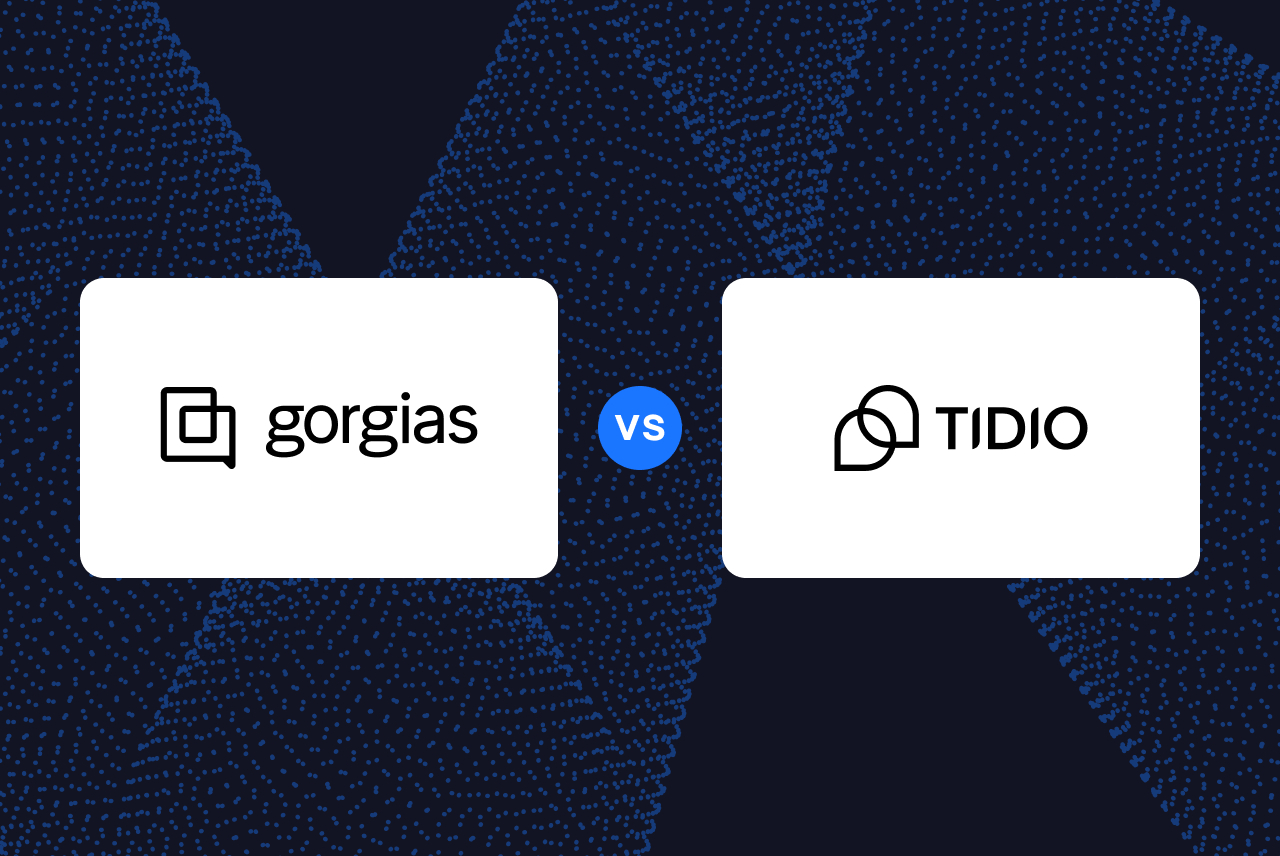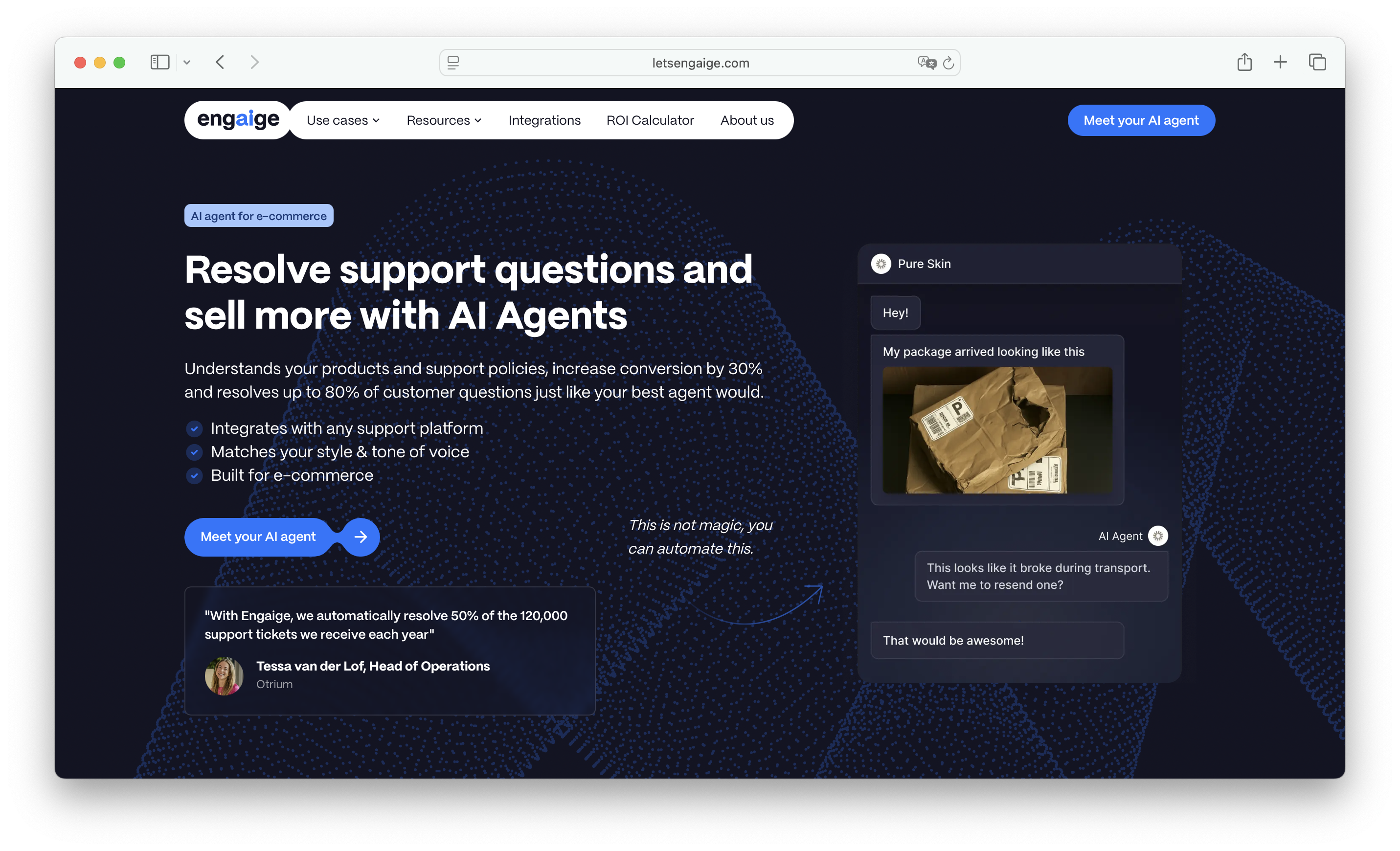Gorgias vs. Tidio: which one is better for e-commerce customer service?
Compare Gorgias and Tidio to find the best AI-powered customer service platform for your e-commerce business. Discover key differences in automation capabilities, AI accuracy, analytics, and more. Plus, explore an alternative that combines the best of both worlds.

TL;DR
- Tidio is best for small to mid-sized e-commerce stores looking for a cost-effective, easy-to-deploy AI chatbot solution
- Gorgias is best for mid-to-large e‑commerce brands that need deep Shopify/commerce actions and advanced automation
- Engaige is your best bet if you’re a mid-size or enterprise e-commerce brand seeking deep automation and an end-to-end AI resolution (with full transparency and control)
If you’re looking for an AI solution to help you with e-commerce customer support, you’re probably considering either Tidio or Gorgias. While these are both great additions to your CS tech stack, they’re not the same tools.
To help you figure out which one works best for your e-commerce business, we wrote the below Tidio vs. Gorgias comparison. Read on to find out about the difference between the two. We’ll focus on topics like integrations, AI and NLP accuracy, pricing and scalability, and more.
How we made the comparison between Gorgias and Tidio
Let’s be real for a second: we’re comparing Gorgias and Tidio here… on the Engaige blog. So, is this going to be the most perfectly objective comparison you’ll ever read? Probably not. We know our own product better than anyone else and we naturally have opinions.
But here’s the thing: we also know that what you need might be different from what we offer. That’s why we took this comparison seriously. Our goal? To share what we found so you can decide which one’s the best fit for your e-commerce business.
Gorgias vs. Tidio: Key similarities and differences
While both Gorgias and Tidio are designed to help online stores handle customer service more efficiently, they come at the problem from very different angles. Both tools offer live chat, automation features, and integrations with major e-commerce platforms like Shopify. But that’s where the overlap ends.
Gorgias is built as a helpdesk for e-commerce brands. Its strength lies in centralising tickets from email, chat, social media, and SMS, then tying those conversations to real customer and order data. Support agents can refund orders, update shipping details, or apply discounts without ever leaving the platform.
Tidio, on the other hand, is a chatbot-first solution. It’s built for speed: adding it to your store takes minutes, and its AI-powered chatbot, Lyro, can handle a large share of customer questions on its own. Instead of focusing on agent workflows, Tidio focuses on giving shoppers instant answers and nudging them toward purchases.
The key difference comes down to approach. Gorgias is best for teams that want structure, ticketing, and back-office power. Tidio is best for stores that want lightweight automation and a chatbot that talks to customers in real time.
Both can improve customer experience, but they’ll fit very different support strategies.
In this article, we’ll take a look at how these similarities and differences play out across 5 different key categories:
- Ease of implementation and integration
- Automation capabilities
- AI and NLP accuracy
- Analytics and reporting
- Customer support and training
Here’s a quick summary of how Gorgias and Tidio perform across our categories:
Ease of implementation and integration
Gorgias is purpose-built for e-commerce, with deep integrations for Shopify, Magento, and BigCommerce. Setup is straightforward, and it instantly syncs customer data, order history, and refund options into the helpdesk.
Tidio focuses on speed. You can add its live chat widget and chatbot to a store in minutes, with simple plug-ins for platforms like Shopify and WordPress. While integration is fast, it doesn’t go as deep into e-commerce workflows like refunds or order edits.
👉 The verdict: Gorgias wins on depth of e-commerce integration, while Tidio takes the crown for quick setup.
Automation capabilities
Gorgias uses rules, macros, and triggers to automate repetitive tickets, things like shipping updates or “where’s my order?” questions. It’s built for structured workflows and can scale with a growing support team.
Tidio is chatbot-first. Its visual “flow builder” makes it easy to automate FAQs, lead capture, and proactive sales nudges. It’s slightly more marketing-oriented than Gorgias but excellent for real-time engagement.
👉 The verdict: Gorgias is best for back-office ticket automation. Tidio shines for chatbot-driven engagement.
AI and NLP accuracy
Gorgias positions its AI as an agent assistant. It suggests replies, handles simple tickets, and keeps the human team in control. It’s accurate on common support topics but not designed to replace agents entirely.
Tidio’s Lyro AI is more ambitious, and aims to resolve up to 85% of customer questions. It handles FAQs well but can stumble on nuanced or unusual queries, occasionally needing retraining or a human handover.
👉 The verdict: Gorgias delivers safe, assistive AI. Tidio offers more ambitious automation but with occasional accuracy gaps.
Analytics and reporting
Gorgias covers the basics: ticket volumes, response times, CSAT, and agent productivity. It’s enough for day-to-day tracking, but teams looking for advanced insights might find it a bit thin.
Tidio offers clean dashboards for chat and engagement metrics, helping teams see how chat impacts sales and response times. It’s intuitive but, like Gorgias, can feel limited for those needing exportable, granular reporting.
👉 The verdict: Gorgias has functional ticket analytics, while Tidio has clear engagement dashboards. Neither is a powerhouse, but both cover the essentials.
Customer support and training
Gorgias earns high marks for onboarding and training. Its support team is responsive, and resources like webinars and documentation make rollout smoother for larger e-commerce teams.
Tidio is equally praised for its customer support. Its team is friendly, quick to respond, and the help center is robust. Because Tidio is simpler, many teams need little formal training to get up and running.
👉 The verdict: It’s a tie. Both offer excellent support, though Gorgias invests more in structured onboarding, while Tidio wins on simplicity.
Gorgias and Tidio: which platform should you choose?
✅ Choose Gorgias if: you’re a growing or mid-to-large e-commerce brand that needs deep Shopify actions, ticket-based workflows, and structured automation for your support team.
✅ Choose Tidio if: you’re a smaller or fast-moving store that wants an easy-to-set-up chatbot solution, real-time engagement, and automation without heavy processes.
In short: Gorgias is the better fit for structured e-commerce support teams, while Tidio is the go-to for lightweight, chatbot-first support.
Engaige: a true AI customer agent
But hold up. What if there was a third option for AI-based support ticket resolution, besides Gorgias and Tidio? Wouldn’t that be cool? 😉
Introducing: Engaige.

How Engaige is different from Gorgias and Tidio:
- Built by a team of CX and automation experts, specifically for e-commerce
- Automate resolution of up to 80% of incoming support tickets
- 100% transparency/control over the AI agent’s behavior
- Increase in-store conversions by up to 30%
There are several ways in which Engaige truly sets itself apart from tools like Gorgias and Tidio. For one, Engaige’s main focus is on e-commerce businesses. And while it’s true that, if you’re an e-commerce business and you had to pick, Gorgias would be a better fit than Tidio…
Engaige’s AI agent takes the full spectrum of requirements into account that mid-size or enterprise e-commerce brands face. Handling from 2,500 to 10,000+ incoming support tickets per month?
Read up on how Otrium used Engaige to instantly resolve 50% of its 120,000 incoming support queries.
Prefer video? Check out the story below:
Other than that, Engaige is designed to interpret live order and carrier data, apply brand-specific policies, and resolve WISMO or refund questions automatically, avoiding simple deflection (e.g., “here’s your tracking link”) and instead taking actual resolution steps if permitted by policies.
Its key strengths:
- Transparent AI decision logic
- Autonomous support ticket resolution with built-in policy control,
- Deep integrations with support workflows and e-commerce platforms
But probably the most important difference with Gorgias and Tidio is that Engaige’s AI agent integrates fully with your product catalogue.
Meaning you can expect higher conversion rates (up to 30% higher) because the AI agent is able to effectively assist customers to find the right product. And helping struggling customers find the thing they’re looking for, instantly, on auto-pilot also means significantly happier customers.
Ready to scale support the smart way? Book a demo and discover the power of Engaige’s AI agents for e-commerce.
Gorgias vs. Tidio: FAQs for e-commerce brands
To round up this article, we’d like to bring you some answers to frequently asked questions e-commerce brands are often left with when comparing Gorgais and Tidio.
Is Gorgias or Tidio better for my e-commerce store?
It depends on your setup: Gorgias is great for structured ticketing, while Tidio is ideal for lightweight chatbot support. But if you’re scaling fast and want end-to-end automation with real resolution (not just replies) Engaige is the better fit.
Can Gorgias or Tidio fully replace human support agents?
Both tools offer strong assistive features. Gorgias through structured workflows, Tidio via chatbot flows. But they still depend on human support for more nuanced queries.
How much does Gorgias vs. Tidio cost for growing e-commerce brands?
Tidio offers budget-friendly plans with chatbot basics, while Gorgias scales pricing based on ticket volume and feature depth. For teams focused on long-term efficiency, the return on investment often comes down to how much of the support load can be automated.
What’s the best AI customer service solution for e-commerce?
If you’re looking for true automation that actually solves customer issues, not just deflects them, Engaige leads the pack with policy-driven AI that acts, decides, and improves over time.
Why choose Engaige over Gorgias or Tidio?
The best solution depends on your team’s needs, of course. But Engaige goes beyond chat or ticketing, and is specifically built for mid-size and enterprise e-commerce brands. Even better if these brands operate in the fashion, beauty and consumer electronics industries (these tend to have higher volumes of incoming support tickets).
Engaige fully automates support with guardrails, integrates into your stack, and gives you full control over AI behaviour, making it ideal for e-commerce brands ready to scale without compromise. Go check it out, and who knows: you might just meet your new AI agent, today.
Lower your cost per resolution with AI customer service automation
Further reading
Continue learning with these resources about AI customer service automation.








.webp)
